2020校外培训机构英语培训计划
2020校外培训机构英语培训计划

2020校外培训机构英语培训计划校外的培训机构在英语培训方面有什么计划呢?下面是由小编为大家整理的“2020校外培训机构英语培训计划”,仅供参考,欢迎大家阅读。
2020校外培训机构英语培训计划(一)目前的培训层出不穷,形态万千,面对激烈的市场竞争力,我主张将培训办在郊区或是农村较偏的地方,开拓新的市场,发展自己的品牌。
开办培训中心,最重要的是选址,我主张将培训办在离学校较近的地方,不仅可以拥有做宣传的地理优势,而且培训生源的发展也能得到保障。
且办学地点即要保障学生的安全问题,又要防止学生对周围环境造成过多的麻烦和干扰。
因此,我建议办学楼层不宜过高,且较独立,有宽敞的学生活动空间更好。
培训中心要能发展,一定要适应市场的需要,并且逐步形成自己的办学特色。
面对新的市场,我们需要了解市场的需要,因此,接下来要考察市场,了解学生的学习状况,学校的上课特点,学习课本,他们的家长对孩子的期待及他们让孩子到培训学习的经济承受能力等。
由我的经验得知,目前培训应多样化,才能有所发展,首先针对学生的弱科,小学以语文,数学,英语为主,辅以美术,舞蹈。
初高中以英语,数学为主,辅以化学,物理。
当然这些都要以市场需要为准。
培训的时间要充分利用学生的课外时间,除了周末,寒暑假,还可以利用学生放学时对学生进行作业辅导。
培训中心的品牌名称:xx英语培训中心(待议)培训中心的教学理念:没有较不好的学生,只有不想学的学生。
培训中心的办学理念:兴趣是学生最好的老师,方法是学好知识的捷径。
不断激发学生的兴趣,引导学生找寻科学的学习方法,培养学生良好的学习习惯。
培训的宣传模式:发传单,利用学生放假前后,在家长接送孩子时,给家长讲解宣传我们培训的内容,地址,时间安排。
通过提问了解学生的学习状况,有针对性的给家长讲解我们培训可以给他孩子的学习带来帮助。
考虑家长的疑虑和不信任,我们可以有三种宣传方式:第一,开展公开课。
也就是说在开课的第一天,我们邀请家长带领孩子一起听课,课后,与家长交流,以博得家长的信任。
英语培训机构工作计划3篇

英语培训机构工作计划3篇方面:1)认真备课,制定教学计划,确保教学进度和教学质量。
2)严格按照教学大纲和教材要求,注重学生的能力培养和综合素质提高。
3)及时批改作业,并对学生的表现进行评价和记录,及时与家长沟通交流,积极解决学生研究中的问题。
2.课堂教学方面:1)采用多种教学方法,注重学生的参与和互动,提高学生的研究兴趣和积极性。
2)注重课堂氛围的营造,创设良好的研究环境,让学生在轻松愉悦的氛围中研究。
3)注重课堂效果的评估和总结,及时反思教学过程,不断改进自己的教学方法和策略。
3.个人研究和教研方面:1)利用课余时间,积极研究教育教学理论和相关知识,提高自己的业务素质。
2)参加学校组织的教研活动,认真研究和记录,积极参与讨论,取长补短,提高自身的教育教学水平。
4.纪律方面:1)认真遵守学校的各项管理制度和纪律要求,按时到校上课,不早退、不迟到。
2)严格执行请假制度,如有特殊情况及时向领导请假,并做好请假手续。
3)认真完成学校交办的各项任务,积极参与学校各项活动,为学校的发展贡献自己的力量。
总之,作为一名英语教师,我将以饱满的热情和扎实的工作作风,认真履行自己的职责,努力提高教学质量和教学效果,为学校教育事业的发展做出自己的贡献。
进行课堂教学督导活动,对每位老师进行3次以上的课堂督导,并及时反馈意见和建议,帮助老师提高教学质量。
2)20xx年4月份--6月份,开展教师培训活动,邀请专家学者来校授课,提高教师的业务能力和教学水平。
3)20xx年9月份--10月份,开展学生评教活动,收集学生对教师的评价,及时发现问题并加以改进。
4)20xx年11月份--12月份,组织教师参观其他学校,研究其他学校的先进经验,为自己的教学工作提供借鉴和启示。
四.总结教学质量是学校的生命线,提高教学质量是我们的工作重点。
通过加强教师队伍建设、强化日常工作规范、提高自身业务能力和带动新老师等措施,我们可以不断提高教学质量,为学生提供更好的教育服务。
英语培训机构教学计划(20篇)

英语培训机构教学计划(20篇)篇1:培训机构学生教学计划一、指导思想1、按照学校XX届人才培养方案的要求,全面落实教学常规、提高教学教育质量,培养能力强、素质高的应用型汽车专业技术初中级人才。
2.围绕课程体系、教学内容和教学方法的改革,探索我校模块化教学的具体实施方法。
3、遵照“基础知识够用、实用能力广、操作技能精、创新意识强,设计思维新颖”的原则组织教学。
4、提高学生分析问题能力、知识综合运用能力、抽象思维能力,形成严谨踏实的工作作风。
二、教材分析1、教材采用模块组合的方法2.突出新知识、新技术、新设备的应用。
3、体现了汽车运用技术中级工应知应会的要求,突出了实践教学环节。
4.本期完成本教材模块4、6、7的教学,本学期每周4节课。
三、学情分析1、学生经过一期的学习,有一定的专业素养,缺乏专业理论基础,但好动手。
2、学生对汽车专业的学习热情较高。
3.学生学习能力不够强,工作作风不够踏实。
4、全班学生人数较多,都是男生,教学难度大四、教学目标1、能描绘汽油机燃料系的组成及各元件的作用。
会对汽油机燃料系的常见故障进行检修。
2、能阐述润滑系的作用和组成,能识别润滑系各部件会对汽油机润滑系的常见故障进行检修。
3、能说明冷却系统的功能和组成,能识别冷却系统的部件。
会修理汽油发动机冷却系统的常见故障。
五、教学重点与难点1、燃料供给系、润滑系、冷却系、的组成及各部件的作用是教学的重点。
2、供油系统、润滑系统、冷却系统零部件维修是学习的难点。
六、具体措施及教学方法1、坚持“教、学、做”合一的原则,灵活运用多重教学方法与手段。
2、主要采用计算机辅助教学手段,通过制作电子教案、多媒体课件,形成教学课件系列。
3.主要采用现场教学、案例教学和项目教学。
4、加强对学生学习情况的检查与督促。
5、注重抓好实践教学环节,加强对学生动手操作能力的培养和专业技能的提高。
篇2:培训机构学生教学计划一、目的和任务树立我队快速敏捷准确的作风,培养顽强团结的战斗作风。
英语培训学校培训计划6篇
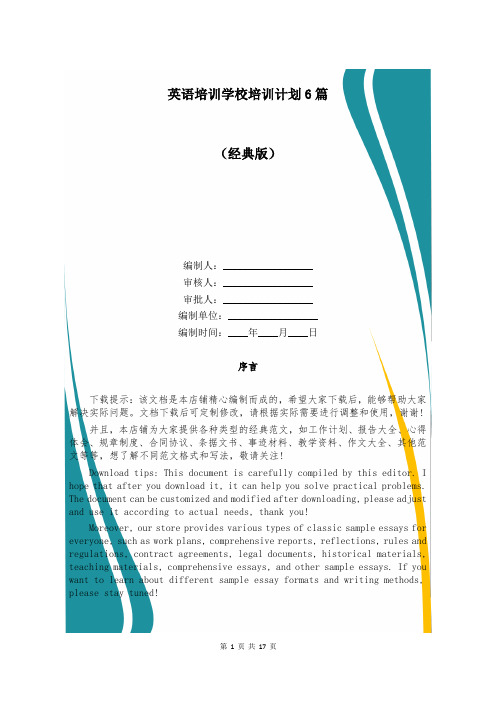
英语培训学校培训计划6篇(经典版)编制人:__________________审核人:__________________审批人:__________________编制单位:__________________编制时间:____年____月____日序言下载提示:该文档是本店铺精心编制而成的,希望大家下载后,能够帮助大家解决实际问题。
文档下载后可定制修改,请根据实际需要进行调整和使用,谢谢!并且,本店铺为大家提供各种类型的经典范文,如工作计划、报告大全、心得体会、规章制度、合同协议、条据文书、事迹材料、教学资料、作文大全、其他范文等等,想了解不同范文格式和写法,敬请关注!Download tips: This document is carefully compiled by this editor. I hope that after you download it, it can help you solve practical problems. The document can be customized and modified after downloading, please adjust and use it according to actual needs, thank you!Moreover, our store provides various types of classic sample essays for everyone, such as work plans, comprehensive reports, reflections, rules and regulations, contract agreements, legal documents, historical materials, teaching materials, comprehensive essays, and other sample essays. If you want to learn about different sample essay formats and writing methods, please stay tuned!英语培训学校培训计划6篇一份成功的培训计划需要充分考虑实际培训的内容和过程,一份完善的培训计划能够提高培训活动的效果和质量,下面是本店铺为您分享的英语培训学校培训计划6篇,感谢您的参阅。
英语培训机构课外辅导计划

英语培训机构课外辅导计划引言英语作为一门国际通用语言,在现代社会中具有越来越重要的地位。
随着全球化的发展,人们对于英语学习的需求也在不断增加。
因此,为了提高学生的英语水平,提供一套全面系统的课外辅导计划变得尤为重要。
本文旨在探讨英语培训机构课外辅导计划的制定和实施,以期为英语教学工作者提供一些有益的建议和参考。
一、课外辅导计划的目标1. 提高学生的英语听说读写能力,打下坚实的语言基础。
2. 培养学生对英语学习的兴趣和自信心,激发他们学习英语的积极性。
3. 培养学生的英语思维能力和沟通能力,使他们能够在实际生活中运用英语进行交流和表达。
4. 培养学生的跨文化意识和全球意识,帮助他们更好地适应国际社会发展的需要。
二、课外辅导计划的内容1. 听力训练通过听力训练,学生可以提高自己对于英语的听力理解能力,同时也能够积累丰富的词汇和语言表达方式,使得他们能够更好地理解和运用所学知识。
(1)听力材料的选择选择一些生活化、实用性强的听力材料,例如英语电影、纪录片、英语广播节目等,以吸引学生的兴趣和提高学习的积极性。
(2)听力训练的形式以听写、听力理解题等形式进行听力训练,让学生在听力练习中不断提高对于语音语调的感知和英语句子的理解。
2.口语训练通过口语训练,学生能够自然而然地提高自己的口语表达能力,使得自己能够更优雅自如地进行英语口语交流。
(1)口语训练的主题选择一些贴近生活、充满情感的口语主题,如家庭、友谊、旅行等,引导学生进行口语表达并进行实际对话练习。
(2)口语训练的方式采取角色扮演、情景对话等方式进行口语训练,培养学生的英语表达能力和实际应用能力。
3.阅读训练通过阅读训练,学生能够提高自己的阅读理解能力,同时也能够拓展自己的知识面和词汇量,培养自己的阅读兴趣和英语思维能力。
(1)阅读材料的选择选择一些适合学生阅读的英文读物,如英语小故事、报纸杂志、英文简章等,丰富学生的阅读内容。
(2)阅读训练的形式通过课外阅读、阅读理解测试等形式进行阅读训练,引导学生提高阅读理解能力,同时也能够培养他们的阅读习惯和方法。
培训班英语培训教学计划
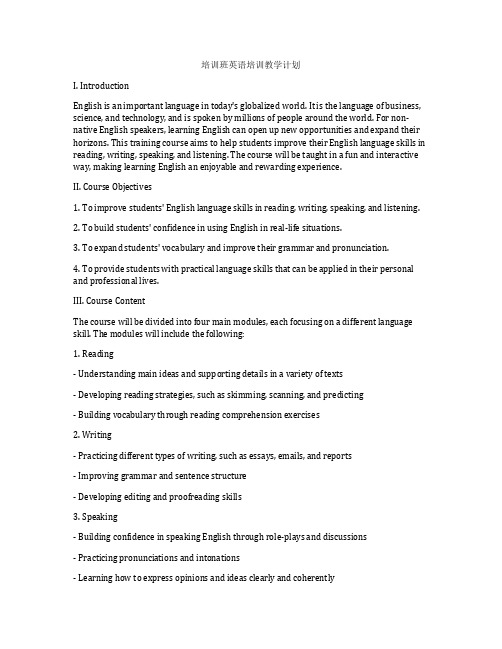
培训班英语培训教学计划I. IntroductionEnglish is an important language in today's globalized world. It is the language of business, science, and technology, and is spoken by millions of people around the world. For non-native English speakers, learning English can open up new opportunities and expand their horizons. This training course aims to help students improve their English language skills in reading, writing, speaking, and listening. The course will be taught in a fun and interactive way, making learning English an enjoyable and rewarding experience.II. Course Objectives1. To improve students' English language skills in reading, writing, speaking, and listening.2. To build students' confidence in using English in real-life situations.3. To expand students' vocabulary and improve their grammar and pronunciation.4. To provide students with practical language skills that can be applied in their personal and professional lives.III. Course ContentThe course will be divided into four main modules, each focusing on a different language skill. The modules will include the following:1. Reading- Understanding main ideas and supporting details in a variety of texts- Developing reading strategies, such as skimming, scanning, and predicting- Building vocabulary through reading comprehension exercises2. Writing- Practicing different types of writing, such as essays, emails, and reports- Improving grammar and sentence structure- Developing editing and proofreading skills3. Speaking- Building confidence in speaking English through role-plays and discussions- Practicing pronunciations and intonations- Learning how to express opinions and ideas clearly and coherently4. Listening- Developing listening skills through audio and video materials- Understanding different accents and speech patterns- Practicing note-taking and summarizing skillsIV. Teaching MethodologyThe course will be taught using a communicative approach, focusing on active participation and interaction among students. This will include group activities, pair work, and class discussions to encourage students to use English in real-life situations.The course will also incorporate a variety of teaching techniques, such as games, role-plays, and multimedia materials, to make the learning process engaging and enjoyable.V. Course ScheduleThe course will be conducted over a period of 12 weeks, with each module lasting for 3 weeks. Classes will be held twice a week, with each session lasting for 2 hours.Week 1-3: Reading- Introduction to reading skills and strategies- Reading comprehension exercises- Vocabulary building and word recognitionWeek 4-6: Writing- Introduction to different types of writing- Grammar and sentence structure- Practice in writing essays, emails, and reportsWeek 7-9: Speaking- Confidence-building activities- Pronunciation and intonation practice- Role-plays and discussionsWeek 10-12: Listening- Listening comprehension exercises- Understanding different accents and speech patterns- Note-taking and summarizing practiceVI. Assessment and EvaluationStudents' progress will be assessed through various methods, including assignments, quizzes, and presentations. Continuous assessment will be done to monitor students' development throughout the course. At the end of the course, a final assessment will be conducted to evaluate students' overall performance.VII. ConclusionThe English training course aims to equip students with practical language skills that they can apply in their personal and professional lives. By improving their English language skills, students will be able to communicate more effectively and confidently, opening up new opportunities for them in today's globalized world. The course will be taught in an engaging and interactive way, making learning English an enjoyable and rewarding experience for all students.。
2023校外培训机构英语培训计划

2023校外培训机构英语培训计划1500字2023年校外英语培训计划一、培训目标本英语培训计划旨在提升学生的英语听、说、读、写四项基本技能,培养学生的英语思维和交际能力,提高英语课外学习的主动性和积极性,为学生将来更好地应对考试和实际应用奠定基础。
二、培训时间本培训计划将持续一年,共计36周。
每周学生需参加两次培训课程,每次2小时,共计4小时。
三、培训内容1. 口语训练本课程将通过生动有趣的口语练习、角色扮演、小组讨论等形式,培养学生流利、自然地运用英语进行交流和表达的能力。
课程将包括日常用语、商务英语、旅游英语等方面的练习。
同时,鼓励学生在校外实践中运用所学知识进行交流,通过真实场景的练习加深对英语口语的理解和熟练度。
2. 听力训练本课程将通过听力材料、听力理解题和听力练习等方式,帮助学生提高听力技巧和听力理解能力。
培养学生在各种情景下听懂、理解并运用英语进行交际的能力。
3. 阅读训练本课程将通过阅读材料、阅读理解题和阅读训练等方式,培养学生的阅读理解能力和阅读速度。
同时,通过阅读不同类型的文章和故事,拓宽学生的知识面,培养学生的阅读习惯和阅读兴趣。
4. 写作训练本课程将通过写作材料、写作练习和作文指导等方式,帮助学生提高写作表达能力和语法运用能力。
培养学生对不同类型的写作文体有一定的掌握,能够用英语进行清晰、连贯和规范的写作。
四、培训方式培训课程将采用小班授课方式,每班不超过20人,保证每位学生能够得到充分的互动和个性化的教学。
同时,将采用多媒体教学手段和教学技术,提高课堂教学效果。
五、培训评估培训过程中将进行定期的课堂测验和阶段性考试,以评估学生的学习情况和掌握程度。
同时,将鼓励学生积极参与课堂讨论和小组活动,培养学生的思维能力和团队合作精神。
六、培训费用本培训计划的费用为每个学生1000元/月。
费用包括教材费和培训费,不包括课外活动费用。
七、其他安排除了培训课程外,还将组织学生参加一些课外活动,如英语角、英语比赛等,丰富学生的英语学习经验和实践机会。
校外培训机构英语培训计划

校外培训机构英语培训计划1. IntroductionThe importance of English language skills in today's globalized world cannot be overstated. Whether it's for academic, professional, or personal reasons, being proficient in English opens up a world of opportunities for individuals. As a result, there is a growing demand for high-quality English language training programs, and off-campus training institutions have emerged as crucial providers of such services. This comprehensive English training program aims to meet the needs of learners of various age groups and proficiency levels, offering a mix of innovative teaching methods, cutting-edge resources, and personalized learning experiences.2. Program ObjectivesThe main objectives of the English training program are:a) To enhance participants' proficiency in English language skills, including reading, writing, speaking, and listening.b) To help participants develop a deep understanding of English grammar, vocabulary, and pronunciation.c) To create a supportive and stimulating learning environment that encourages active participation and collaboration among learners.d) To provide learners with the opportunity to apply their English skills in real-life contexts, such as through role-plays, group discussions, and project-based tasks.e) To foster a love for the English language and an appreciation for its cultural significance.3. Program StructureThe English training program will be divided into different levels based on participants' proficiency levels, ranging from beginner to advanced. Each level will comprise a series of modules that cover different aspects of English language learning, such as grammar, vocabulary, reading, writing, speaking, and listening. The program will also include a range of supplementary activities, such as workshops, language labs, and cultural events, to provide a holistic learning experience.4. Teaching MethodsThe English training program will employ a combination of traditional and modern teaching methods to cater to diverse learning styles and preferences. These may include:a) Communicative approach: Emphasizing the use of English in real-life communication contexts, such as role-plays, debates, and problem-solving tasks.b) Task-based learning: Encouraging learners to complete meaningful tasks, such as creating presentations, writing essays, and conducting research, to develop their language skills.c) Technology-assisted learning: Using multimedia resources, online platforms, and educational apps to enhance learners' engagement and interactivity.d) Collaborative learning: Organizing group activities, pair work, and team projects to promote peer interaction and cooperative learning.e) Individualized instruction: Providing personalized feedback, coaching, and support to address the specific needs and goals of each learner.5. Course ContentThe English training program will cover a wide range of topics and themes that are relevant to learners' interests and needs. This may include:a) General English: Developing fundamental language skills, such as grammar, vocabulary, pronunciation, and comprehension, through a variety of interactive activities.b) Business English: Equipping learners with the language and communication skills required for professional settings, such as writing emails, conducting meetings, and delivering presentations.c) Academic English: Preparing learners for academic pursuits, such as essay writing, note-taking, critical reading, and academic presentations.d) Exam preparation: Assisting learners in preparing for standardized English proficiency exams, such as TOEFL, IELTS, and Cambridge English.e) English for specific purposes: Tailoring the content to meet the specific needs of learners, such as English for tourism, hospitality, healthcare, or engineering.6. Assessment and Progress MonitoringThroughout the program, participants' progress will be closely monitored through regular assessments, feedback sessions, and self-evaluation tasks. This approach aims to provide learners with a clear understanding of their strengths, areas for improvement, and progress towards achieving their language learning goals. It will also enable instructors to identify any challenges or difficulties that learners may be facing and provide targeted support and guidance.7. Learning ResourcesThe English training program will make use of a variety of learning resources to support learners' language acquisition and skill development. These may include:a) Textbooks and workbooks: Providing relevant and up-to-date learning materials that cover different language skills and levels.b) Multimedia resources: Access to online platforms, educational software, and language learning apps to reinforce and complement classroom instruction.c) Authentic materials: Using real-life materials, such as news articles, podcasts, videos, and songs, to expose learners to natural language use and cultural contexts.d) Language labs: Offering specialized facilities for practicing speaking, listening, and pronunciation through interactive exercises and audio-visual resources.e) Library resources: Access to a range of English-language books, magazines, and reference materials for independent study and research.8. Instructors and Support StaffThe English training program will be delivered by a team of experienced and qualified instructors who possess expertise in English language teaching and are dedicated to supporting learners' language development. In addition, a support staff will be available to assist participants with administrative matters, academic advice, and other relevant services to ensure a smooth and enriching learning experience.9. Program Duration and ScheduleThe English training program will be offered on a part-time basis, with flexible schedules to accommodate learners' other commitments. Each level will typically consist of a certain number of learning hours, with additional practice and self-study opportunities encouraged.10. ConclusionIn conclusion, this English training program at our off-campus training institution aims to provide a comprehensive and engaging learning experience that is tailored to the diverse needs and goals of learners. By combining innovative teaching methods, cutting-edge resources, and personalized support, we seek to empower participants to achieve their full potential in English language proficiency and confidence. We believe that the program will not only elevate learners' language skills but also foster a lifelong appreciation for the English language and its global impact. Thank you for considering our English training program, and we look forward to welcoming you to our institution.。
校外英语培训学期工作计划
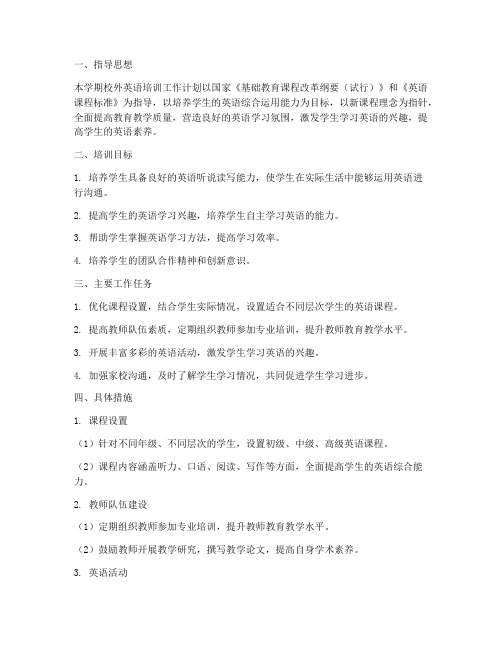
一、指导思想本学期校外英语培训工作计划以国家《基础教育课程改革纲要(试行)》和《英语课程标准》为指导,以培养学生的英语综合运用能力为目标,以新课程理念为指针,全面提高教育教学质量,营造良好的英语学习氛围,激发学生学习英语的兴趣,提高学生的英语素养。
二、培训目标1. 培养学生具备良好的英语听说读写能力,使学生在实际生活中能够运用英语进行沟通。
2. 提高学生的英语学习兴趣,培养学生自主学习英语的能力。
3. 帮助学生掌握英语学习方法,提高学习效率。
4. 培养学生的团队合作精神和创新意识。
三、主要工作任务1. 优化课程设置,结合学生实际情况,设置适合不同层次学生的英语课程。
2. 提高教师队伍素质,定期组织教师参加专业培训,提升教师教育教学水平。
3. 开展丰富多彩的英语活动,激发学生学习英语的兴趣。
4. 加强家校沟通,及时了解学生学习情况,共同促进学生学习进步。
四、具体措施1. 课程设置(1)针对不同年级、不同层次的学生,设置初级、中级、高级英语课程。
(2)课程内容涵盖听力、口语、阅读、写作等方面,全面提高学生的英语综合能力。
2. 教师队伍建设(1)定期组织教师参加专业培训,提升教师教育教学水平。
(2)鼓励教师开展教学研究,撰写教学论文,提高自身学术素养。
3. 英语活动(1)举办英语角、英语演讲比赛、英语歌曲比赛等活动,激发学生学习英语的兴趣。
(2)邀请外籍教师进行现场教学,提高学生的英语口语水平。
4. 家校沟通(1)定期召开家长会,向家长反馈学生学习情况,共同探讨学生成长问题。
(2)建立家校联系册,及时了解学生学习动态,共同促进学生成长。
五、学期工作计划时间安排1. 第一阶段(第1-4周):课程设置、教师培训、英语活动筹备。
2. 第二阶段(第5-12周):正常开展英语课程,举办英语角、英语演讲比赛等活动。
3. 第三阶段(第13-16周):总结学期工作,开展期末考试,评选优秀学员。
六、总结与评价1. 学期末对教师工作进行评价,总结经验教训,为下学期工作提供参考。
英语培训学校的工作计划
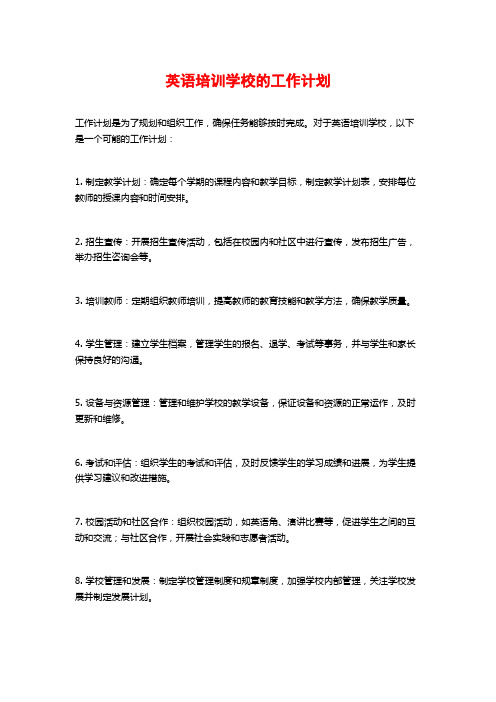
英语培训学校的工作计划
工作计划是为了规划和组织工作,确保任务能够按时完成。
对于英语培训学校,以下是一个可能的工作计划:
1. 制定教学计划:确定每个学期的课程内容和教学目标,制定教学计划表,安排每位教师的授课内容和时间安排。
2. 招生宣传:开展招生宣传活动,包括在校园内和社区中进行宣传,发布招生广告,举办招生咨询会等。
3. 培训教师:定期组织教师培训,提高教师的教育技能和教学方法,确保教学质量。
4. 学生管理:建立学生档案,管理学生的报名、退学、考试等事务,并与学生和家长保持良好的沟通。
5. 设备与资源管理:管理和维护学校的教学设备,保证设备和资源的正常运作,及时更新和维修。
6. 考试和评估:组织学生的考试和评估,及时反馈学生的学习成绩和进展,为学生提供学习建议和改进措施。
7. 校园活动和社区合作:组织校园活动,如英语角、演讲比赛等,促进学生之间的互动和交流;与社区合作,开展社会实践和志愿者活动。
8. 学校管理和发展:制定学校管理制度和规章制度,加强学校内部管理,关注学校发展并制定发展计划。
9. 吸引国际学生:积极开展国际交流与合作,吸引国际学生来校学习,并提供相关支持和服务。
10. 监督和评估:定期进行工作评估和监督,根据评估结果及时调整工作计划,提高工作效率和质量。
2023校外培训机构英语培训计划

2023校外培训机构英语培训计划1500字2023校外培训机构英语培训计划一、培训目标:1. 提高学员的英语听、说、读、写、译等综合能力;2. 培养学员的英语思维能力,增强学员的自信心和表达能力;3. 帮助学员掌握英语学习方法和策略,发展学习自主性;4. 培养学员的英语文化意识,培养跨文化交际能力。
二、培训内容:1. 口语训练:通过对话、情景练习、口语游戏等活动,培养学员的口语表达能力;2. 听力训练:通过听力材料、听力练习,提高学员的听力理解能力;3. 阅读训练:通过阅读材料、阅读理解练习,提高学员的阅读能力;4. 写作训练:通过写作练习、作文指导,提高学员的写作能力;5. 翻译训练:通过翻译练习,提高学员的翻译能力;6. 文化背景教育:通过英语歌曲、电影、文学作品等,培养学员的英语文化意识。
三、培训形式:1. 小组培训:每个小组人数不超过10人,根据学员的英语水平分组;2. 授课形式:采用互动式教学,通过师生互动、小组活动等,激发学员的学习兴趣;3. 实践训练:定期组织学员参加英语角、英语竞赛等实践活动,提高学员的实际运用能力。
四、培训安排:1. 培训时间:每周六、周日上午9:00-12:00,下午14:00-17:00;2. 培训周期:总计12周,每周6小时,共计72小时;3. 培训地点:承办机构教室,保证良好的学习环境;4. 培训方法:集中授课、练习、复习相结合,提高学习效果;5. 培训材料:提供教材、练习册、听力材料、阅读材料等,便于学员学习和巩固。
五、培训评估:1. 课堂表现评估:根据学员的作业完成情况、课堂参与情况等,进行评估;2. 学习成果评估:每周末进行小测验,检验学员的学习成果;3. 学员反馈评估:定期进行学员评估问卷调查,了解学员对培训内容、方式的意见和建议。
六、培训费用:1. 基本费用:10000元/人,包含教材费用、培训费用等;2. 优惠政策:早报名者可享受8折优惠,团报名可享受9折优惠,多人同行可享受更低折扣。
英语培训教学计划5篇
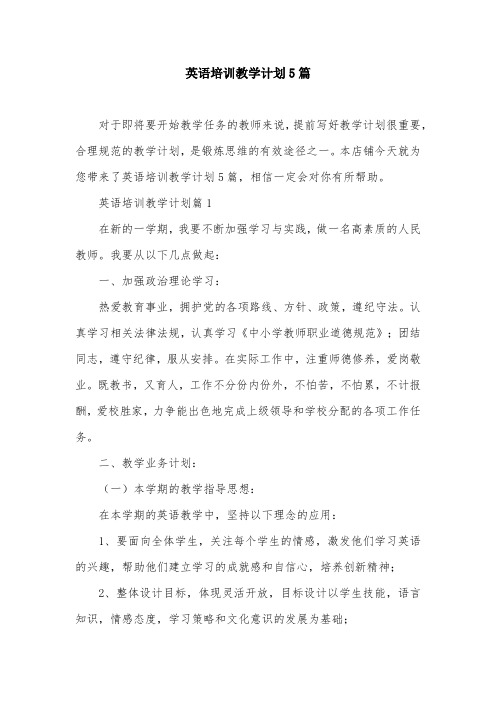
英语培训教学计划5篇对于即将要开始教学任务的教师来说,提前写好教学计划很重要,合理规范的教学计划,是锻炼思维的有效途径之一。
本店铺今天就为您带来了英语培训教学计划5篇,相信一定会对你有所帮助。
英语培训教学计划篇1在新的一学期,我要不断加强学习与实践,做一名高素质的人民教师。
我要从以下几点做起:一、加强政治理论学习:热爱教育事业,拥护党的各项路线、方针、政策,遵纪守法。
认真学习相关法律法规,认真学习《中小学教师职业道德规范》;团结同志,遵守纪律,服从安排。
在实际工作中,注重师德修养,爱岗敬业。
既教书,又育人,工作不分份内份外,不怕苦,不怕累,不计报酬,爱校胜家,力争能出色地完成上级领导和学校分配的各项工作任务。
二、教学业务计划:(一)本学期的教学指导思想:在本学期的英语教学中,坚持以下理念的应用:1、要面向全体学生,关注每个学生的情感,激发他们学习英语的兴趣,帮助他们建立学习的成就感和自信心,培养创新精神;2、整体设计目标,体现灵活开放,目标设计以学生技能,语言知识,情感态度,学习策略和文化意识的发展为基础;3、突出学生主体,尊重个体差异;4、采用活动途径,倡导体验参与,即采用任务型的教学模式,让学生在老师的指导下通过感知、体验、实践、参与和合作等方式,实现任务的目标,感受成功;5、注重过程评价,促进学生发展,建立能激励学生学习兴趣和自主学习能力发展的评价体系。
总之,让学生在使用英语中学习英语,让学生成为good user而不仅仅是learner。
让英语成为学生学习生活中最实用的工具而非累赘,让他们在使用和学习英语的过程中,体味到轻松和成功的快乐,而不是无尽的担忧和恐惧。
(二)所教班级学生基本情况分析:本学期,将继续担任20XX级汽修专业的英语教学工作。
上学期,在班主任的大力配合和本人的不懈努力下,本班学生的基础知识得到了加强,学习态度也有所好转。
但是学生整体的惰性还是很强,自觉性很差。
另外,学生在情感态度、学习策略方面还存在诸多需要进一步解决的问题。
英语培训学校工作计划

英语培训学校工作计划
工作计划
1. 设定目标:确定每个学期的英语培训目标,包括提高学生听说读写能力,增加词汇量,提高语法和表达能力等等。
2. 制定教学计划:根据学生的水平和需求制定每周的教学计划,并将其分解为每日的课程计划。
3. 教学准备:每日根据课程计划准备相应教材、教具、练习题等教学资源。
4. 教学实施:按照教学计划有组织地进行英语教学,包括词汇、语法、听说读写等方面的综合训练。
5. 学生评估:定期进行学生的英语水平评估,包括口语表达、阅读理解、写作能力等方面的测试。
6. 个别辅导:根据学生的个别差异,提供有针对性的辅导,帮助学生解决学习问题和提高英语水平。
7. 与家长沟通:定期与学生的家长进行沟通,了解学生的学习情况,并提供相关建议和反馈。
8. 教师培训:参加相关英语教学培训,不断提升自己的教学能力和教育理念。
9. 学校行政工作:完成学校相关的行政工作,包括记录学生出勤情况、填写教学报告等。
10. 教学反思:定期对自己的教学进行反思和总结,不断优化教学方法和教学效果。
以上是英语培训学校的工作计划,旨在为学生提供系统的英语培训课程,并帮助他们提高英语能力。
英语培训机构学习计划

英语培训机构学习计划1. IntroductionIn today's globalized world, the ability to communicate effectively in English is more important than ever. Whether for academic, professional, or personal reasons, fluency in English can open up a world of opportunities. As an English training institution, it is our goal to provide our students with the skills and knowledge they need to achieve proficiency in the English language. This learning plan outlines our approach to training and the resources we will utilize to ensure the success of our students.2. ObjectivesThe primary objective of our English training program is to enable our students to speak, read, write, and understand English with confidence and proficiency. Specifically, our objectives are as follows:- To develo p students’ listening and speaking skills to enable effective communication in a variety of contexts.- To improve students’ reading and writing skills for academic and professional purposes.- To expand students’ vocabulary and grammar knowledge to facili tate more advanced language use.- To familiarize students with different English accents and dialects to enhance their listening comprehension.- To prepare students for standardized English proficiency exams such as TOEFL, IELTS, and Cambridge English exams.- To encourage students to engage with English-speaking cultures and societies to deepen their understanding of the language.3. CurriculumOur English training program is designed to be comprehensive and immersive, encompassing a range of language skills and contexts. The curriculum is divided into different levels, each with its own specific objectives and content. The curriculum is based on the Common European Framework of Reference for Languages (CEFR) and covers the following areas:- Listening and speaking: Conversational skills, pronunciation, understanding different accents, and participating in discussions.- Reading and writing: Reading comprehension, text analysis, essay writing, and academic writing skills.- Vocabulary and grammar: Building vocabulary, understanding grammar rules, and using language effectively.- Exam preparation: Strategies for success in standardized English proficiency exams.- Culture and society: Exploration of English-speaking cultures, traditions, and current events.4. Teaching MethodologyOur teaching methodology is designed to be dynamic and interactive, emphasizing the practical application of language skills in real-world contexts. We utilize a variety of teaching techniques to accommodate different learning styles and preferences, including the following:- Communicative approach: Emphasis on speaking and interactive activities to develop fluency and confidence.- Task-based learning: Use of authentic tasks and projects to engage students and promote language use.- Audio-visual materials: Incorporation of multimedia resources such as videos, podcasts, and interactive software for diverse learning experiences.- Language games and activities: Engaging exercises to reinforce vocabulary, grammar, and pronunciation skills.- Role-playing and simulations: Opportunities for students to practice realistic communicative situations.- Peer collaboration: Group work and pair activities to foster communication and cooperation among students.5. ResourcesWe are committed to providing our students with the best resources available for language learning. Our institution offers access to a wide range of materials and facilities, including:- Textbooks and workbooks: High-quality course materials with structured content and exercises.- Audio-visual materials: Online platforms, documentaries, films, and podcasts to reinforce listening and speaking skills.- Language labs: Computer-equipped rooms for interactive language practice and digital resources.- Library: Extensive collection of English-language books, periodicals, and reference materials for reading and research.- Online resources: Access to language learning apps, websites, and digital platforms for independent study.- Language tutors: Experienced and qualified language tutors for individualized support and guidance.6. Assessment and FeedbackRegular assessment and feedback are integral parts of our learning plan to gauge the progress and performance of our students. We use a variety of assessment methods to evaluate language proficiency, including:- Written tests: Evaluating reading comprehension, writing skills, and grammar knowledge.- Speaking tests: Assessing oral fluency, pronunciation, and communicative abilities.- Listening tests: Measuring listening comprehension and understanding of different accents.- Participation and classwork: Monitoring students’ engagement, contribution, and interaction in class activities.- Assignments and projects: Encouraging independent research, critical thinking, and application of language skills.- Mock exams: Simulating real exam scenarios to prepare students for standardized tests.Feedback on students’ performance is provided on an ongoing basis, and students are encouraged to reflect on their strengths and areas for improvement. Tutors also offer personalized feedback to guide students’ development and set goals for further progress.7. Extracurricular ActivitiesIn addition to the core curriculum, our English training institution offers a range of extracurricular activit ies to enhance students’ language learning experience. These include: - Conversation clubs: Informal meetups for students to practice speaking and exchange ideas in English.- Film screenings: Showing of English-language films followed by discussions and analysis.- Cultural events: Celebrations of English-speaking holidays, festivals, and traditions.- Guest speakers: Inviting native English speakers and experts to share insights and engage with students.- Study trips: Visits to English-speaking countries and cultural sites to immerse students in authentic language contexts.- Language exchange programs: Pairing students with native English speakers for language practice and cultural exchange.These activities aim to provide students with opportunities to apply their language skills in authentic settings, engage with English-speaking communities, and broaden their understanding of the language and culture.8. Progress and SupportAs part of our commitment to student success, we provide ongoing support and guidance to help students achieve their language learning goals. This includes:- Progress monitoring: Regular tracking of students’ performance and progress to identify areas for improvement.- Individualized support: Tailored assistance and guidance for students with specific learning needs or challenges.- Goal-setting: Collaborative establishment of learning objectives and targets to motivate students’ advancement.- Counseling and mentorship: Personalized advice and mentoring for academic, language, and career development.- Alumni network: Connection with former students and graduates for advice, networking, and mentorship.We believe that a supportive and nurturing environment is essential for effective language learning and are dedicated to guiding our students throughout their language learning journey.9. ConclusionIn conclusion, our English training institution is committed to providing a comprehensive and immersive learning experience for our students. We aim to equip them with the language skills and knowledge they need to succeed in a globalized world. Our learning plan encompasses a diverse range of resources, activities, and support mechanisms to enable students to achieve proficiency in English. We are dedicated to empowering our students to communicate confidently, think critically, and succeed in their personal and professional endeavors.。
培训学校英语培训计划7篇
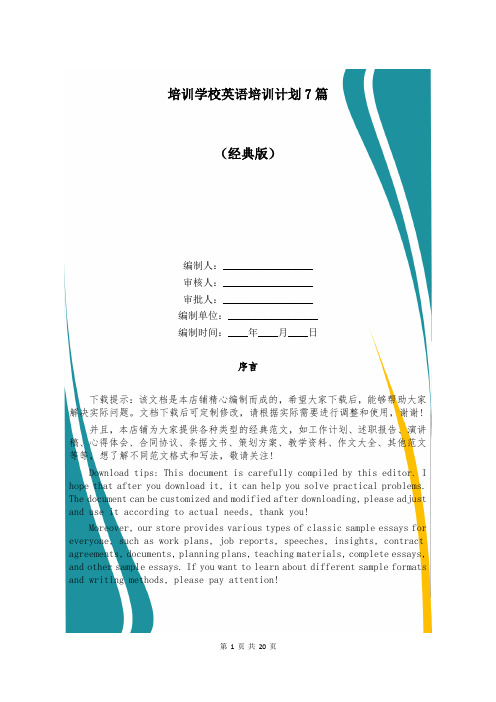
培训学校英语培训计划7篇(经典版)编制人:__________________审核人:__________________审批人:__________________编制单位:__________________编制时间:____年____月____日序言下载提示:该文档是本店铺精心编制而成的,希望大家下载后,能够帮助大家解决实际问题。
文档下载后可定制修改,请根据实际需要进行调整和使用,谢谢!并且,本店铺为大家提供各种类型的经典范文,如工作计划、述职报告、演讲稿、心得体会、合同协议、条据文书、策划方案、教学资料、作文大全、其他范文等等,想了解不同范文格式和写法,敬请关注!Download tips: This document is carefully compiled by this editor. I hope that after you download it, it can help you solve practical problems. The document can be customized and modified after downloading, please adjust and use it according to actual needs, thank you!Moreover, our store provides various types of classic sample essays for everyone, such as work plans, job reports, speeches, insights, contract agreements, documents, planning plans, teaching materials, complete essays, and other sample essays. If you want to learn about different sample formats and writing methods, please pay attention!培训学校英语培训计划7篇培训计划是我们参加活动之前必须要准备好的文件材料,有了一份优秀的培训计划做辅助,接下来的培训活动才能更好地进行,本店铺今天就为您带来了培训学校英语培训计划7篇,相信一定会对你有所帮助。
培训班英语教学工作计划
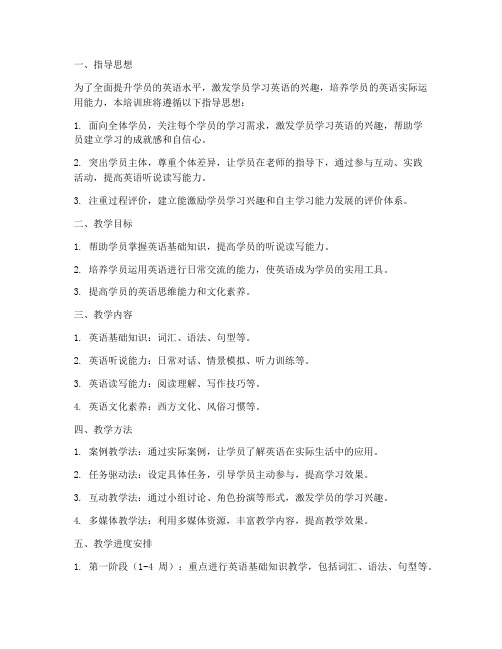
一、指导思想为了全面提升学员的英语水平,激发学员学习英语的兴趣,培养学员的英语实际运用能力,本培训班将遵循以下指导思想:1. 面向全体学员,关注每个学员的学习需求,激发学员学习英语的兴趣,帮助学员建立学习的成就感和自信心。
2. 突出学员主体,尊重个体差异,让学员在老师的指导下,通过参与互动、实践活动,提高英语听说读写能力。
3. 注重过程评价,建立能激励学员学习兴趣和自主学习能力发展的评价体系。
二、教学目标1. 帮助学员掌握英语基础知识,提高学员的听说读写能力。
2. 培养学员运用英语进行日常交流的能力,使英语成为学员的实用工具。
3. 提高学员的英语思维能力和文化素养。
三、教学内容1. 英语基础知识:词汇、语法、句型等。
2. 英语听说能力:日常对话、情景模拟、听力训练等。
3. 英语读写能力:阅读理解、写作技巧等。
4. 英语文化素养:西方文化、风俗习惯等。
四、教学方法1. 案例教学法:通过实际案例,让学员了解英语在实际生活中的应用。
2. 任务驱动法:设定具体任务,引导学员主动参与,提高学习效果。
3. 互动教学法:通过小组讨论、角色扮演等形式,激发学员的学习兴趣。
4. 多媒体教学法:利用多媒体资源,丰富教学内容,提高教学效果。
五、教学进度安排1. 第一阶段(1-4周):重点进行英语基础知识教学,包括词汇、语法、句型等。
2. 第二阶段(5-8周):加强听说能力训练,包括日常对话、情景模拟、听力训练等。
3. 第三阶段(9-12周):提高读写能力,包括阅读理解、写作技巧等。
4. 第四阶段(13-16周):拓展英语文化素养,了解西方文化、风俗习惯等。
六、教学评价1. 定期进行口语测试,评估学员的听说能力。
2. 定期进行写作测试,评估学员的读写能力。
3. 通过课堂表现、作业完成情况等,综合评价学员的学习效果。
4. 鼓励学员自我评价,提高学员的学习积极性。
七、教学保障1. 提供丰富的教学资源,包括教材、课件、练习题等。
辅导班英语培训计划方案

一、背景分析随着全球化的推进,英语已成为国际交流的重要工具。
为了帮助学员提高英语水平,拓宽国际视野,本辅导班特制定英语培训计划方案,旨在为广大英语学习者提供专业、系统的英语培训。
二、培训目标1. 提高学员的英语听说读写能力,使学员具备基本的英语交流能力;2. 培养学员的英语思维习惯,提高学员的英语应用能力;3. 帮助学员了解英语国家的文化,拓宽国际视野;4. 激发学员学习英语的兴趣,提高学员的自信心。
三、培训对象1. 青少年英语学习者;2. 成人英语学习者;3. 英语爱好者。
四、培训内容1. 基础英语:词汇、语法、句型等;2. 听力训练:新闻、对话、短文等;3. 口语表达:日常交流、情景对话、演讲等;4. 阅读理解:短文、长文、篇章等;5. 写作能力:作文、书信、报告等;6. 英语国家文化:风土人情、历史地理、名人轶事等。
五、培训方法1. 小班教学:每班学员控制在15人以内,确保教学质量;2. 情景模拟:通过模拟真实场景,提高学员的英语应用能力;3. 分阶段教学:根据学员的英语水平,分阶段设置教学内容;4. 多媒体教学:利用多媒体资源,提高教学效果;5. 互动式教学:鼓励学员积极参与课堂活动,提高学习兴趣。
六、培训安排1. 周一至周五,每天2课时;2. 周六、周日,每天3课时;3. 每月进行一次阶段性测试,以检验学员的学习成果;4. 每学期末进行一次总结性考试,为学员提供反馈。
七、师资力量1. 具备丰富的英语教学经验;2. 拥有专业的英语教学资格证书;3. 熟悉英语国家的文化背景;4. 具有良好的沟通能力和团队协作精神。
八、培训费用1. 青少年英语学习者:每人每课时30元;2. 成人英语学习者:每人每课时40元;3. 英语爱好者:每人每课时50元。
九、报名方式1. 现场报名:学员可到辅导班现场报名;2. 网络报名:学员可通过辅导班官方网站、微信公众号等渠道进行报名。
十、结语本辅导班英语培训计划方案旨在为广大英语学习者提供优质、专业的英语培训。
英语校外培训机构工作计划
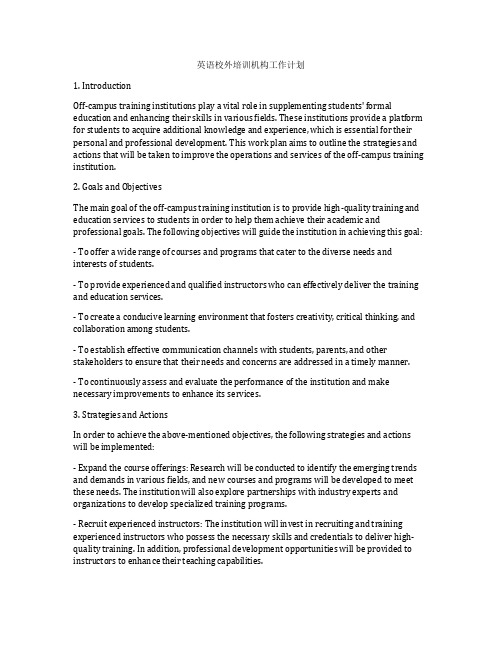
英语校外培训机构工作计划1. IntroductionOff-campus training institutions play a vital role in supplementing students' formal education and enhancing their skills in various fields. These institutions provide a platform for students to acquire additional knowledge and experience, which is essential for their personal and professional development. This work plan aims to outline the strategies and actions that will be taken to improve the operations and services of the off-campus training institution.2. Goals and ObjectivesThe main goal of the off-campus training institution is to provide high-quality training and education services to students in order to help them achieve their academic and professional goals. The following objectives will guide the institution in achieving this goal:- To offer a wide range of courses and programs that cater to the diverse needs and interests of students.- To provide experienced and qualified instructors who can effectively deliver the training and education services.- To create a conducive learning environment that fosters creativity, critical thinking, and collaboration among students.- To establish effective communication channels with students, parents, and other stakeholders to ensure that their needs and concerns are addressed in a timely manner.- To continuously assess and evaluate the performance of the institution and make necessary improvements to enhance its services.3. Strategies and ActionsIn order to achieve the above-mentioned objectives, the following strategies and actions will be implemented:- Expand the course offerings: Research will be conducted to identify the emerging trends and demands in various fields, and new courses and programs will be developed to meet these needs. The institution will also explore partnerships with industry experts and organizations to develop specialized training programs.- Recruit experienced instructors: The institution will invest in recruiting and training experienced instructors who possess the necessary skills and credentials to deliver high-quality training. In addition, professional development opportunities will be provided to instructors to enhance their teaching capabilities.- Improve the learning environment: The institution will invest in upgrading its facilities and equipment to create a more conducive learning environment for students. This may include upgrading classrooms, introducing new teaching aids, and providing access to relevant resources and materials.- Enhance communication channels: The institution will establish regular communication with students, parents, and other stakeholders through various channels such as newsletters, social media, and feedback sessions. This will help in understanding the needs and concerns of the stakeholders and addressing them appropriately.- Continuous assessment and improvement: The institution will establish a system for regularly assessing the performance of its courses, instructors, and overall operations. Feedback from students and other stakeholders will be collected and used to identify areas for improvement, which will be addressed through appropriate measures.4. Timeline and ResourcesThe implementation of the strategies and actions outlined above will be carried out over a period of one year. The following resources will be required to support these activities:- Financial resources for course development, instructor recruitment, facility upgrades, and marketing efforts.- Human resources including administrative staff, instructors, and support personnel.- Time and effort from all stakeholders involved in the planning and implementation process.5. Monitoring and EvaluationThe progress of the institution in achieving its goals and objectives will be regularly monitored and evaluated. Key performance indicators such as student enrollment, course completion rates, student satisfaction, and feedback from stakeholders will be used to assess the effectiveness of the implemented strategies. This will enable the institution to make timely adjustments and improvements to its operations and services.6. ConclusionAchieving the goals and objectives outlined in this work plan will require the concerted efforts and collaboration of all stakeholders involved in the off-campus training institution. By implementing the outlined strategies and actions, the institution will be better positioned to provide high-quality training and education services that meet the diverse needs and interests of students. This will contribute to the overall development and success of the institution and its students.。
- 1、下载文档前请自行甄别文档内容的完整性,平台不提供额外的编辑、内容补充、找答案等附加服务。
- 2、"仅部分预览"的文档,不可在线预览部分如存在完整性等问题,可反馈申请退款(可完整预览的文档不适用该条件!)。
- 3、如文档侵犯您的权益,请联系客服反馈,我们会尽快为您处理(人工客服工作时间:9:00-18:30)。
( 工作计划)单位:____________________姓名:____________________日期:____________________编号:YB-BH-0232102020校外培训机构英语培训计2020 English training plan for off campus training institutions2020校外培训机构英语培训计划2020校外培训机构英语培训计划(一)目前的培训层出不穷,形态万千,面对激烈的市场竞争力,我主张将培训办在郊区或是农村较偏的地方,开拓新的市场,发展自己的品牌。
开办培训中心,最重要的是选址,我主张将培训办在离学校较近的地方,不仅可以拥有做宣传的地理优势,而且培训生源的发展也能得到保障。
且办学地点即要保障学生的安全问题,又要防止学生对周围环境造成过多的麻烦和干扰。
因此,我建议办学楼层不宜过高,且较独立,有宽敞的学生活动空间更好。
培训中心要能发展,一定要适应市场的需要,并且逐步形成自己的办学特色。
面对新的市场,我们需要了解市场的需要,因此,接下来要考察市场,了解学生的学习状况,学校的上课特点,学习课本,他们的家长对孩子的期待及他们让孩子到培训学习的经济承受能力等。
由我的经验得知,目前培训应多样化,才能有所发展,首先针对学生的弱科,小学以语文,数学,英语为主,辅以美术,舞蹈。
初高中以英语,数学为主,辅以化学,物理。
当然这些都要以市场需要为准。
培训的时间要充分利用学生的课外时间,除了周末,寒暑假,还可以利用学生放学时对学生进行作业辅导。
培训中心的品牌名称:xx英语培训中心(待议)培训中心的教学理念:没有较不好的学生,只有不想学的学生。
培训中心的办学理念:兴趣是学生最好的老师,方法是学好知识的捷径。
不断激发学生的兴趣,引导学生找寻科学的学习方法,培养学生良好的学习习惯。
培训的宣传模式:发传单,利用学生放假前后,在家长接送孩子时,给家长讲解宣传我们培训的内容,地址,时间安排。
通过提问了解学生的学习状况,有针对性的给家长讲解我们培训可以给他孩子的学习带来帮助。
考虑家长的疑虑和不信任,我们可以有三种宣传方式:第一,开展公开课。
也就是说在开课的第一天,我们邀请家长带领孩子一起听课,课后,与家长交流,以博得家长的信任。
第二,可以先让学生试听两次课,两次课后,与家长,学生交流,学生自认为在此培训学习可以得到进步,再缴费报名。
第三,如果学生报名数量较少,我们可以让前三名报名的学生免除课时费,只需缴纳资料费。
除此以外,我们还可以再学生第一次上课之前给他们一次测试,原始成绩记入史册,待培训结束时,再让同样的试卷给学生测试,利用两次分数的对比,让家长亲眼目睹学生在我们培训中心的提高。
2020校外培训机构英语培训计划(二)一、主要工作目标和任务1、抓好学校教学稳步发展,争取把各个班级的留生率保持在90%以上。
2、努力学习理论知识,在教学实践中提高自己的教学质量,让学生喜欢课堂,并在课堂中获得的收获。
二、具体工作和措施1、教学常规管理教学质量的好坏直接影响学校的生存,教学质量是学校的生命线,是学校的工作重点。
课堂教学是提高教学质量的关键,充分利用好课堂,我们内部老师要起到一个监督,督促的作用。
充分发挥以教师为主导,学生为主题的教学活动,调动学生学习的积极性,培养学生的能力,学生成绩的提高才是我们学校的宣传。
2、加强教师队伍建设(1)老师一定要做到:尊重学生、信任学生、了解学生、研究学生、帮助学生、关心学生、正确评价学生;(2)关心和帮助新老师。
对他们的工作给以指导和帮助。
安排新老师听课,试讲,帮助他们纠正工作中的错误,并且多给新老师锻炼的机会,让他们快速成长起来,能够为学校的发展做出贡献。
3、强化日常工作规范(1)按时交工作周计划,学期个人工作总结等。
(2)搞好各个老师工作的的安排和评定工作。
(3)希望能够有时间到其他学校去学习经验。
4、加强学习,提高自身业务能力,提高教学质量(1)学习教育理论,提高自身道德修养要求自己经常阅读相关的报刊杂志、通过上网浏览最新的教育理念,用新的教学理念和教学方法来使自己始终能够拥有新鲜的血液。
努力通过自己的课堂教学使学生学得轻松,学有所得,真正成为学生心目中学习的引导者。
此外,作为一名老师,不仅仅是学生学习知识的引导者,更是学生人品学习的楷模。
在教学过程中,我们不能只是培养学生的知识水平,同时也要注重学生道德修养的提高,所以,我自己要先学会怎样快乐地学习、生活,从我做起,而不是说一套做另一套,严格要求自己的行为,这样,学生才会从我这学到一些他们所需要的;同时,自己也要时时刻刻关心国家大事,了解时事,尽力做好自己的本职工作。
(2)提高教学能力,并带动新老师。
要热爱学生,对学生有博爱之心,要以诚相待,要宽容和有强烈的责任感。
在教学过程中认真研究教材,立足于学生的角度来研究教材,积极备课,认真上好每一堂课,及时做好课后反思,总结出自己教学中的不足之处并加以改正。
在教学方式中继续探索生活化、情境化的创设方法,掌握生活化、情境化的课堂风格。
从而丰富教学方式,激发学生的学习兴趣。
重视单位中新生力量,对他们积极培养,让新老师听课,同时听新老师的课,取长补短,共同进步。
把课上好,把学生留住,是我们的共同目标。
三、具体活动安排(1)2020年x月份--x月份稳定现有生源,做好任课教师的工作,顺利上好寒假课,做好教材准备工作,做好家长的接待和沟通工作。
安排好现有老师的工作任务和工作时间,做好与老师的沟通工作,让老师们能够开心的在金子塔工作。
2020校外培训机构英语培训计划(三)一、指导思想xx师范大学外语系以服务少数民族和贫困地区为宗旨,在当地教育局的统一部署与安排下,重组我系英语学科教师教育资源与中学英语教学实践资源,与xx县基地学校共同建立起为期一年的周末流动师资培训学院,计划在xx县培养x-x名研究型初中英语骨干教师,帮助他们更有效地更新教育教学理念和专业知识,提高学科教育理论修养和教学研究能力,并以他们为种子队员,推动教师所在学校的“校本教师培训”与反思性实践活动的开展,促进琼中县初中英语教师队伍的专业化进程,实现xx县英语学科课程改革和x师大外语系英语学科教学研究的双赢目标。
二、培训目标研究型骨干教师应该具有较强的英语学科教学能力和愿意对英语教学进行反思性实践研究的积极态度与基本技能,包括:1、能够清楚地描述自己教学的目标、具体过程、结果和存在的教学问题;2、对个人教学有自我监控的意识与能力(包括能够有效观察课堂、记录、反思和讲述自己的教学决策思路);3、能够对教学进行质量评价、分析和诊断,并能够处理自己的教学问题;4、能够对教师的课堂教学行为进行内容分析、学会对教学进行比较与归纳;5、能够用有关语言、学习、教学等相关的外语教学理论对教师教学行为背后的原因进行推理和解释;6、习惯于与其他同伴教师进行反思性交流与合作;7、对自己的教学问题或某种课堂现象能够采用正确方式进行调查;8、能够对自己的调查数据进行处理和对调查结果进行讨论,并能将自己的调查过程与结论撰写成行动研究报告。
三、培训内容x师大周末流动师资培训学院英语学科从2020年x月开始至2020年x月结束,在xx县进行为期两个学期的周末培训活动。
本培训着眼于提高教师个人对外语“教”与“学”的个人理解,发展教师自身的专业发展意识与对个人教学行为与思维过程进行研究的意识。
为此,教师将以所在学校教研小组为单位学会开展经常性的教学反思与交流活动,以提高其自我专业发展的技术和能力,特别是进行教学行动研究所需要的各种方法、手段与技巧,并通过这种互助性的(Peer-Support)小组研究活动,在交互性的学习与研究中学会总结和扩展自己的教学实践知识,为教师专业的终生发展打好坚实的基础。
第一学期(2020-x-x至2020-x-x)集中培训14个周末,培训内容主要为(1)英语学科教学知识与技能的学习与交流;(2)英语课堂教学的分析与评估;(3)英语教学反思与交流等三部分,包括训练营学科教学知识与技能学习4×14学时,案例分析为主的课堂教学研究4×14学时,校本互助型教学反思与研究,并辅之以网络上的教学研究指导共x个月,每周一次,约2×28学时,共计168学时(详见上学期培训安排),学校工作计划《英语培训学校工作计划》。
第二学期(2020-x-x至2020-x-x)集中培训5个周末,培训内容主要为(1)英语教学基本理论的应用;(2)英语教学的研究方法;(3)英语教师的行动研究等三部分,包括训练营的英语教学理论讲座与教学研究方法讲座共4×5学时,行动研究案例分析4×5学时,通过网络进行的教学研究指导x个月,每周一次,约2×20学时,共计80学时。
四、培训与检测方式1、主题性集中培训每次集中培训都以一个教学主题为中心进行课堂教学分析与研讨活动,邀请本县全体初中英语教师共同参与,一方面有利于促进全县初中英语教师专业化的整体进程,同时为研究型骨干教师的专业发展提供良好的教师教育氛围与同伴教师之间相互支持和交流合作的人文环境。
凡积极、认真参加每次主题培训活动、并能大胆发表个人意见的教师均可获5学分。
2、自主性记录培训每位研究型骨干教师必须填写专业自查表,包括:(1)本校英语教育的水平、条件和问题;(2)本人从教英语的历史及特长;(3)本人参加培训的需求与打算;每次训练后都要撰写训练笔记,总结收获体会;每次校本的小组反思后都要写教学反思日志;培训期间还要通过电子邮箱和写博客的方式与指导教师和其他学员进行交流,每周至少一次。
凡认真完成以上学习与反思记录工作的教师均可获5学分。
3、任务性检测培训每位研究型骨干教师必须完成以下“专业知识与技能”、“课堂教学研究”和“教学行动研究”三项专业培训任务,以便进行培训目标的全面检测,凡达标者可获10学分,执行细节如下:(1)专业知识与技能培训的任务与检测:每位研究型骨干教师必须在基地学校或所在学校演示1-2节公开课,清楚描述自己的教学目标、过程、结果和所存在的教学问题,接受其他教师的评价与建议,并写出自己公开课的反思报告。
完成公开课任务的教师可获1学分,优质课可加0.5学分,能够在反思报告中清楚描述和分析自己的教学行为、思想过程的教师可再加1学分(共2.5学分)。
(2)课堂教学研究培训的任务与检测:每位研究型骨干教师至少要将自己的1-2节课进行录音,转录成课堂话语文本资料,以便对自己的课堂教学的内容进行归纳性分析,并在指定时间与地点向其他教师报告自己的分析结论。
完成分析文本的教师可获1学分,在分析报告中能正确归纳自己教学行为要点的教师可加1学分,能够在互助组内推广该课堂教学分析方法的教师可再加0.5学分,(共2.5学分)。
